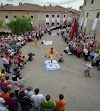Travelling around India, you soon get a feel for the different states, the overlapping cultures and the variances in regional languages - all of which give each pocket of the country its own identity; it's own character, it's own soul. The landscape is no exception. Rajasthan is dry, dusty, and hot. The sun beats down unrelentingly and sucks the moisture out of the red earth. Travelling east through Delhi and the northern plains, the ground flattens out and vast, unbroken agricultural land stretches as far as the eye can see. The northeast, as the elevation rises, is hammered by the annual monsoons; a quick look at a climate chart will tell you that Darjeeling can receive as much rainfall in the month of July as New Delhi receives in a whole year - it is this epic battering that makes the region synonymous with tea plantations.
Along the southwest coast, as the coastline stretches down from Mumbai, in Maharashtra, through Goa, Karnataka and on to Kerala, it follows a common pattern; mile after mile of sandy, palm fringed beaches, lapped by the warm Arabian Sea. Some of this pristine coastline has long been established on the tourist trail: the beaches of Goa are renowned the world over, judging by the holidaymakers that flock there every winter, and Kollam, in Kerala, some 600 kilometres south, has been overwhelmed with development to cater for the seasonal influx. The real gems of the coastline, in my opinion, are the lesser visited spots in between. Gokarna, in Karnataka, is one of them; a small string of beaches that grow quieter as the distance from the bustling little town increases, where you fight for the prime sunbathing spots with the local cows (a fight you can never win). Further south you pass through the Backwaters, a network of lagoons and waterways with tiny settlements on the waterfront; a trip along the backwaters gives the sensation of travelling back in time as much as you're aware of the physical journey forward, and on a small, rickety public ferry, the feeling is exacerbated.
My favourite place on the Keralan coast was Varkala; an auspicious town dotted with ancient temples, and a small, perfectly formed crescent shaped beach at the bottom of a sheer cliff face. Along the clifftop there is a cluster of restaurants and small shops, bars, and ayurvedic treatment centres, but the cliff itself has restricted the growth of imposing hotels and so the town retains it's welcoming, neighbourly feel. I stayed in one of the guesthouses set back a little from the waterfront, where at night, there is nothing to hear but the silence itself, broken by the odd falling coconut. A few of my fellow guests there asked our host, Jayan, about the rumours that every year a handful of people that are hit by falling coconuts, sometimes with serious consequences. I myself had a couple of very near misses, with a coconut, or sometimes an entire leaf falling to the ground beside my feet.
'It happens,' he confirmed 'every tourists asks about this...but Indians, we really don't think about this at all' he added. 'And anyway, this is karma' he said with a grin. A moment later he slapped a mosquito on his arm, killing it instantly. 'Hey' I asked 'isn't this also bad karma, killing mosquitoes?' If it was, I was in for some harsh reparation somewhere down the line. 'It is their bad karma' he told me, absolving himself, and me, from future repercussions.
I could have happily stayed in Varkala for weeks, if not months more. But the ticking clock, sadly, brought my time there to an end after just a week, over Christmas. It was a merry Christmas indeed, and now, sitting in West London with the rain hammering down outside my window, I have to ask myself: how difficult would it be to cope with a cold and frosty winter in Britain, next time around?
I might not stick around to find out.






0 Comments